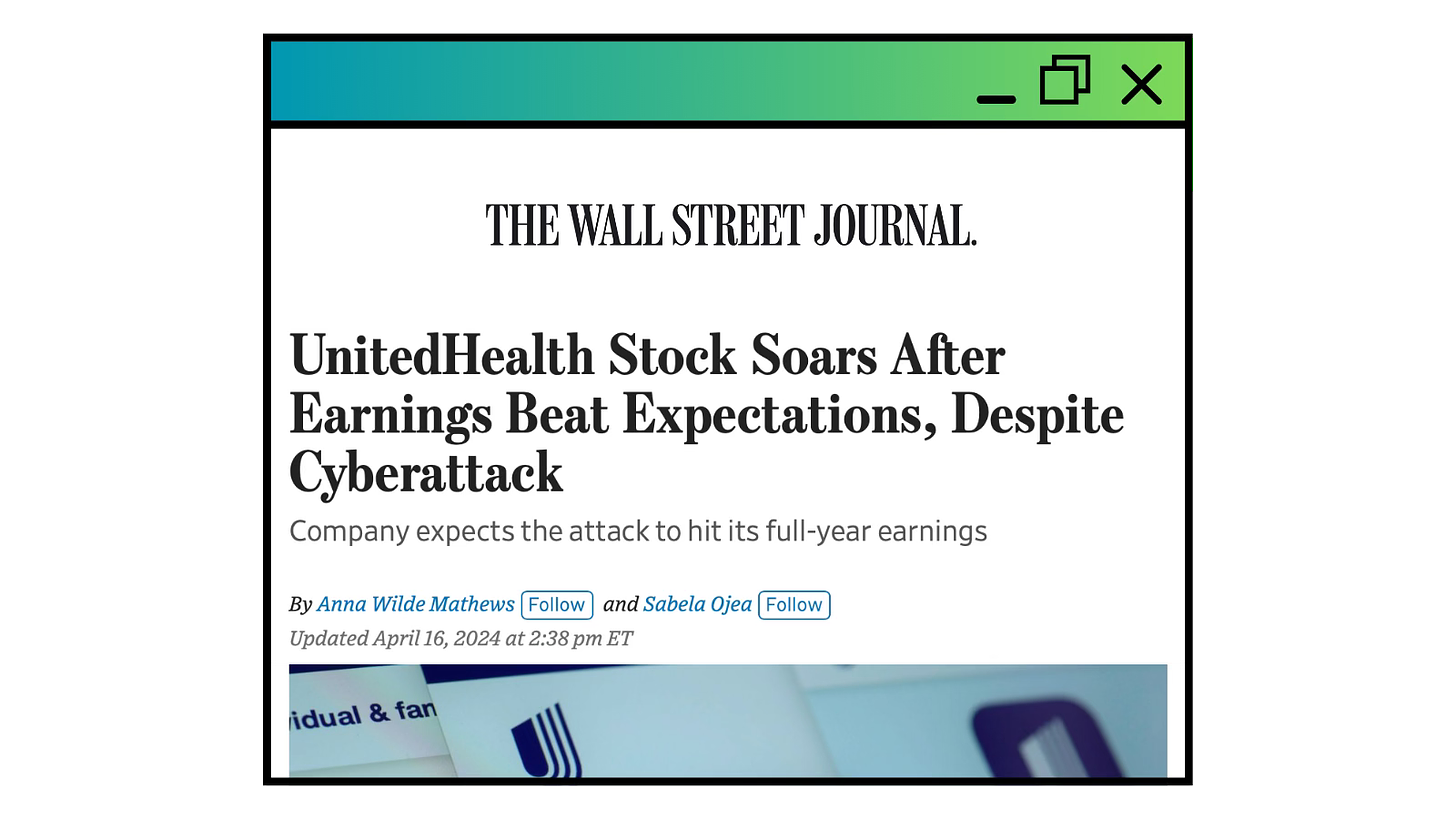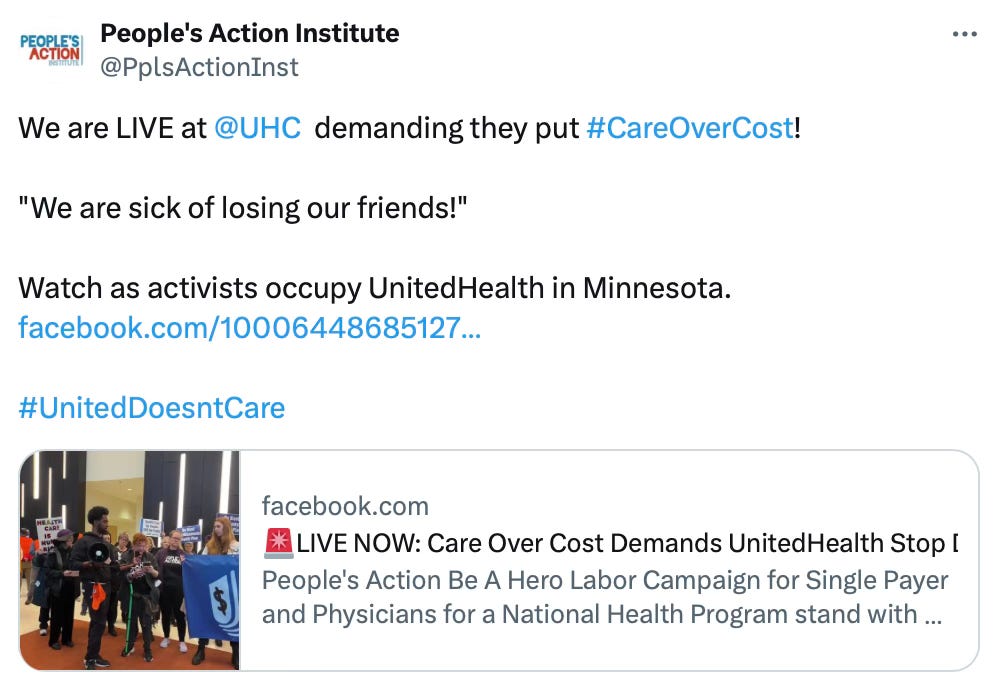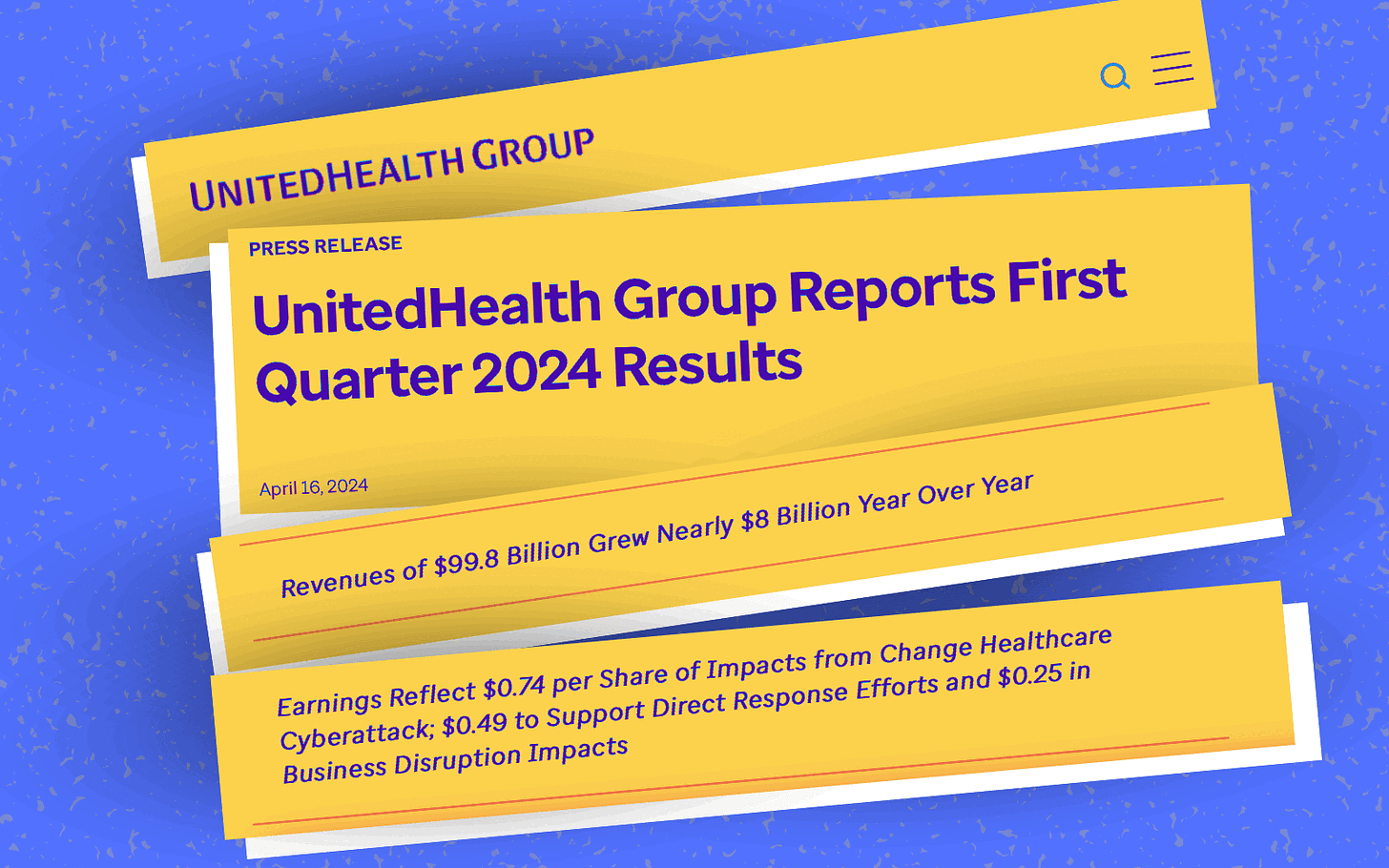

Discover more from HEALTH CARE un-covered
UnitedHealth Group, the Biggest Private Health Insurer on the Planet, Made $8.5 Billion in Profits in Q1 2024
Meanwhile, many physician practices and hospitals nearly went under because of the cyberattack on the company’s Change Healthcare subsidiary.
After being in the Wall Street dog house for months, UnitedHealth Group is back in investors’ good graces today. That’s thanks to a better-than-expected first quarter, despite the February 21 cyberattack on Change Healthcare, its data and claims processing subsidiary that cost health care providers billions of dollars and threatened to put many of them out of business
.
The company reported robust growth in its Medicare Advantage business and told investors and Wall Street financial analysts on a call this morning that it's not worried about the recent announcement by the Biden administration that the government will pay Medicare Advantage plans less next year than the insurance industry had hoped and expected.
Here are some highlights:
UnitedHealth’s total revenues for the first three months of this year were just shy of $100 billion, an increase of 8.6% from the $91.9 billion the company reported for the first quarter of 2023. Revenues have more than tripled over the past decade as the company has moved aggressively into health care delivery, government programs and the pharmacy benefits space. During the same months in 2014, revenues totaled just $31.7 billion. Back then UnitedHealth was the 14th largest U.S. company. It is now the fifth largest, having leapfrogged over companies like Ford and General Motors.
Profits (earnings from operations) increased from $8.1 billion in the first quarter of 2023 to $8.5 billion ($7.9 billion after accounting for cyberattack-related expenses). Over the past 10 years, profits have more than quadrupled, from $2.1 billion in the first quarter of 2014. Net margins also have increased significantly over the decade, from 3.5% in 2014 to 6.1% this past quarter.
A big driver of that growth has been the taxpayer-supported Medicaid and Medicare programs. Enrollment in the Medicaid plans managed by UnitedHealth has increased nearly 80% since 2014, from 4.3 million to 7.7 million. Enrollment in its Medicare Advantage plans has more than doubled over the same period, from 2.99 million in 2014 to 7.76 million. While the growth in Medicare Advantage slowed this year, UnitedHealth, along with Humana and CVS/Aetna, have captured 86% of new enrollees in the privatized version of Medicare so far this year. Medicaid enrollment declined by 165,000 as states began eliminating coverage for many low-income families that had been covered temporarily with increased federal funding during the pandemic.
Enrollment in non-governmental commercial plans–including employer-sponsored plans and Affordable Care Act marketplace plans–grew from 27.3 million to 29.4 million quarter over quarter but has increased by only 200,000 over the past 10 years. Company executives said the recent growth in commercial enrollment has come largely from increasing its market share, possibly as a consequence of the decision by Humana to get out of the commercial insurance space this year so it can focus more exclusively on Medicare Advantage.
Executives said they have set aside $872 million related to the cyberattack, most of it going to restoring Change Healthcare to operability. CEO Andrew Witty said twice during the call with investors that the hack likely would have happened even if Change was not a part of UnitedHealth. He added he believes it’s fortunate Change is a United subsidiary because the parent company has the resources to get it back on track. Expect him to repeat that when he faces members of the Senate Finance Committee on April 30, but also expect him to be grilled much more aggressively by senators than he was this morning by Wall Street analysts. UnitedHealth’s 1Q earnings report came a day after Republican and Democratic leaders of the House Energy & Commerce Committee called on the company to explain how the hack happened and was so costly to health care providers and patients.
Witty declined to comment on a question about the scope of the recently announced investigation of the company by the Department of Justice’s Antitrust Division. “We don’t comment on those sort of matters,” he said. The FTC is also investigating the company as part of its inquiry into the lucrative pharmacy benefit business. UnitedHealth’s Optum Rx unit, along with CVS/Aetna’s Caremark and Cigna’s Express Scripts, now control 80% of the PBM market.
Even as physician practices and hospitals were struggling financially because of delayed payments resulting from the cyberattack, United spent $4.8 billion during the first quarter rewarding shareholders through dividends and buying back shares of its own stock.
The company’s most spectacular growth over the past decade has come from its Optum division, which encompasses the PBM, Change Healthcare and the many physician practices it has acquired over the years. In the first quarter of 2014, Optum’s revenues totaled $11.2 billion. Last quarter they reached $61.1 billion. That’s an increase of more than 445%.
Expect the company to buy even more physician practices and clinics in the future as more and more of them struggle financially, in part because of reduced payments from insurers. Witty said the company will continue to look for M&A opportunities as health care providers encounter “funding changes.” Many financially challenged physician practices essentially have three options to keep their doors open: selling to big hospital systems, private-equity firms or big insurers like UnitedHealth, which already is the biggest employer of physicians in the country.
Witty told investors:
“I continue to see a very interesting diverse pipeline of M&A opportunity across the marketplace in terms of business areas that we have interest in. As I think you see some of the funding changes play out across the -- across the next few years, I suspect that may also create new opportunities for us as different companies assess their positions. I think how we look at this situation is we have a good strong strategy for how we navigate through this dynamic. You're seeing that play out super well in the first quarter performance of Optum Health and UHC and I think it gives us a sense of real confidence as we look not just in terms of our performance, but potentially how we might think about M&A opportunity.
UnitedHealth Group’s stock was up $26.99, more than 6%, to $472.62 a share when the market closed this afternoon, recovering much of the decline in value it has experienced over the past six months. It reached $530.52 on February 23 before the cyberattack was widely known. It fell to $436.38 as recently as last Friday. The company reported earnings per share for the quarter of $6.91, easily beating analysts’ consensus estimate of $6.61. Wall Street is happy with the company again.

Read the full article here. As a result of its rapid growth, UnitedHealth makes far more money now than it did ten years ago by investing premiums and other revenues it gets from customers and state and federal governments. During the first quarter of 2014, the company reported that profits from investments totaled $191 million. Last quarter it made more than $1 billion in income from investments. That’s an increase of nearly 425%.
Postscript: Patient and consumer advocacy groups are now paying close attention to UnitedHealth’s profits and business practices that result in millions of Americans not getting the medications and treatments their doctors order because of excessive out-of-pocket requirements and life-threatening delays and denials.
Earlier today, soon after the company wowed Wall Street with its first-quarter profits, People’s Action staged a protest in front of UnitedHealth’s Minnesota headquarters. People’s Action’s Care Over Cost campaign brought 100 people to meet with UnitedHealth Group executives to demand UnitedHealth stop delaying and denying patient care.

Below is a quote from a petition People’s Action released today calling on the Senate Finance Committee to take action against UnitedHealth Group’s business practices. You can sign the petition here.
Everyone should have the health care they need, when and where they need it. Yet too often, when people get sick, their private health insurance refuses to pay for their care. The largest health insurance corporation, UnitedHealthcare, is one of the worst actors when it comes to denying care. They reported $22.4 billion dollars in profits in 2023 alone! And they make most of their money off of our tax dollars through privatized Medicare and Medicaid.
Subscribe to HEALTH CARE un-covered
Pulling back the curtains on how Big Health is hurting Americans and how we got to this point.





I am a nurse case manager at my local hospital. I work to get people placed in rehab after hospitalization. When we have a patient with UHC Medicare, we cringe. None of the rehabs in our area will contract with UHC because of poor payment or non-payment, even after they've preauthorized the rehab stay. Many UHC patients sit in the hospital because they have nowhere to go and they are too sick to go home. Our hospital system has even made an entire nursing unit dedicated to these patients who are in limbo.
When I talk to Medicare patients with UHC, I've found they've been heavily marketed to buy this insurance. UHC reps will visit nursing homes to market the elderly into buying their Advantage plan. By the time they get to the hospital, they've already had terrible experiences with UHC. I am the one who has to break the news that they can't get the ongoing healthcare they need because of UHC's poor network system, their denials for preauthorization for needed healthcare, or their poor payment, which has burned providers too many times and the refusal to take any more patients with UHC.
Last year, our hospital system lost millions of dollars because of privatized Medicare Advantage insurance and its tactics. In my state of Oregon, an entire Eugene clinic had to sell (to UHC) because it went under.
This is an epidemic, and I am on the front lines, dealing with insurance denials and seeing the carnage of patients who don't get the treatment they need and deserve.
And daily I hear citizens complain about doctors’ compensation. I quickly redirect my patients to look at insurance giants and hospitals. The 2 big winners in our troubled healthcare system.